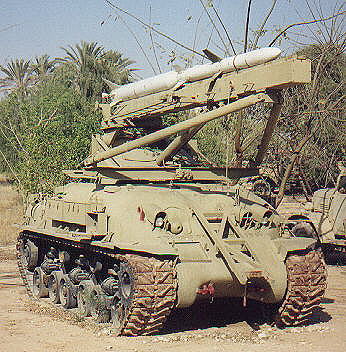Sherman Shrike
missile launcher
|
Many have wondered what that Sherman
missile launcher was that adorned the rear cover of Verlinden's
Israeli
M4 Sherman and derivatives (Warmachines no.4, 1990 -
by the way, great photos of Shermans at Latrun, but do not pay attention
to the text as it really has too many errors).
Thanks to Marsh Gelbart's article
in the Journal of Military Ordnance we now know this is a Shrike
missile launcher. The information from this article was later augmented
with information from an Israeli Sherman Register contributor.
| Sherman Kilshon |
 |
At least two of these Sherman Shrike
missile launchers - known as Sherman Kilshon - are preserved at the Israeli
air force museum at Hatzerim in the Negev desert. One of these is pictured
on the left. Another serves as a the museum's gate guard.
Armament: Shrike air-to-ground anti-radar
missile, modified for ground launch with an Israeli-developed rocket booster
with an Israeli-developed rocket booster.
Chassis: turretless M51 Sherman chassis.
Note: see the Links:
On-line references page for a link to a site featuring more pictures
of the Kilshon. |
In the October 1973 war, Israel suffered
severe losses to Arab air defences. Surface to Air Missiles (SAM) had forced
Israeli aircraft to operate at very low level where they were susceptible
to Anti-Aircraft Artillery. The Shrike air-to-ground anti-radar missile
launched from Phantoms was not altogether successful in clashes with Syrian
forces between October 1973 and April 1974.
Another option was to launch the
Shrike missile with an Israeli-developed rocket booster from a turretless
M51 Sherman chassis. The role of the Kilshon (Hebrew for
Trident) was to take up a position near the battlefield and launch the
Shrike (which had a range of sixteen kilometres in this surface-to-surface
guise) after Israeli aircraft had teased the Arab air defence into switching
on their search and targeting radars.
At least two batteries with 5 Kilshons
each were operational. Kilshon was later further developed into the Keres
(Hebrew for Hook) system. It used the Standard ARM and was prototyped on
a Sherman Kilshon chassis but eventually fielded on standard M809 5 ton
trucks because the antiquated Shermans were being retired. The Kilshon
and Keres were operated for about 20 years by the air defense corps' 153rd
battalion, initially from Palmachim AFB and later on from Ramat David AFB
until it was finally disbanded several years ago.
Sources:
-
Gelbart, Marsh, 'From Sherman Tank To
Shrike Launcher'. Journal of Military Ordnance, Vol.7, No.6, November
1997, p.6.
-
Scan and additional information courtesy
of our main Israeli contributor.
Back to
Sherman encyclopedia page
Last update: 26-03-2000
Copyright © 1988-2000
H.L.
Spoelstra / Sherman Register / All Rights Reserved
